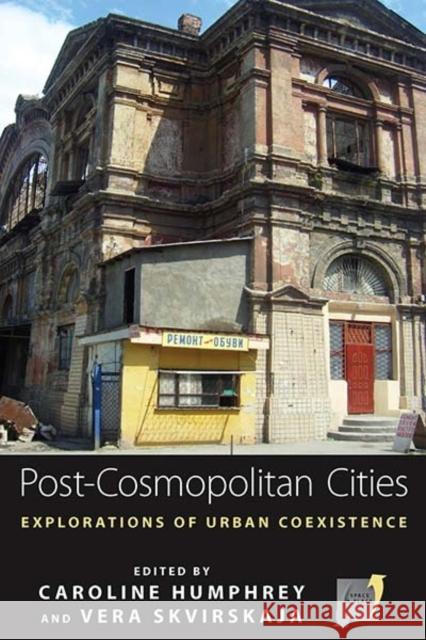Post-cosmopolitan Cities: Explorations of Urban Coexistence » książka
Post-cosmopolitan Cities: Explorations of Urban Coexistence
ISBN-13: 9781782386773 / Angielski / Miękka / 2014 / 260 str.
Post-cosmopolitan Cities: Explorations of Urban Coexistence
ISBN-13: 9781782386773 / Angielski / Miękka / 2014 / 260 str.
(netto: 130,11 VAT: 5%)
Najniższa cena z 30 dni: 134,94
ok. 30 dni roboczych.
Darmowa dostawa!
"What emerges as common features of these cities mark their unique contribution to an understanding of cosmopolitanism as ideal and practice, raising crucial questions about who is or can be cosmopolitan and where cosmopolitanism is in the world. Loosely connected by their orientation to both Europe and Asia, the shifting valences of this outlook over time have important consequences for the cities' respective cosmopolitan-ness, as well as the meaning and nature of cosmopolitanism." - Urban History "In their new book, Caroline Humphrey and Vera Skvirskaja have excelled in building a ...magnificent world of cultural identities without ends. The authors and editors offer a compelling exploration of the multilayered ideas about what makes "us"and "them"in six cities: Odessa, Tbilisi, Warsaw, Venice, Thessalonica, and Dushanbe...Humphrey and Skvirskaja take the deeper, anthropological, microscopic view of the everyday experiences of people. And in this they do an excellent job." - Slavic Review "Taken together, these chapters] individually offer valuable insights into the dynamics of urban co-existence (or lack thereof)... and] reveal that cosmopolitanism's definitions and meanings only exist in the plural, that the formation of cosmopolitan ideas and communities is inevitably contingent and place-specific, and that the forces preaching exclusion and intolerance are often at least as powerful as those promoting cultural acceptance in a rapidly globalising world... a useful text for courses concerned with globalisation and urbanism." - Urban Studies "This volume captures the spirit of the renewed interest in the city] well and delivers a lively set of essays. Here, the shift away from the usual story about immigration and how to cope with it takes us, instead, to a widely shared perception of the loss of diversity and shared lifestyle, often without regard for actual statistics on multi-ethnic urban populations." - Bruce Grant, New York University Examining the way people imagine and interact in their cities, this book explores the post-cosmopolitan city. The contributors consider the effects of migration, national, and religious revivals (with their new aesthetic sensibilities), the dispositions of marginalized economic actors, and globalized tourism on urban sociality. The case studies here share the situation of having been incorporated in previous political regimes (imperial, colonial, socialist) that one way or another created their own kind of cosmopolitanism, and now these cities are experiencing the aftermath of these regimes while being exposed to new national politics and migratory flows of people.
"What emerges as common features of these cities mark their unique contribution to an understanding of cosmopolitanism as ideal and practice, raising crucial questions about who is or can be cosmopolitan and where cosmopolitanism is in the world. Loosely connected by their orientation to both Europe and Asia, the shifting valences of this outlook over time have important consequences for the cities respective cosmopolitan-ness, as well as the meaning and nature of cosmopolitanism." · Urban History"In their new book, Caroline Humphrey and Vera Skvirskaja have excelled in building a ...magnificent world of cultural identities without ends. The authors and editors offer a compelling exploration of the multilayered ideas about what makes "us"and "them"in six cities: Odessa, Tbilisi, Warsaw, Venice, Thessalonica, and Dushanbe...Humphrey and Skvirskaja take the deeper, anthropological, microscopic view of the everyday experiences of people. And in this they do an excellent job." · Slavic Review"Taken together, these [chapters] individually offer valuable insights into the dynamics of urban co-existence (or lack thereof)...[and] reveal that cosmopolitanisms definitions and meanings only exist in the plural, that the formation of cosmopolitan ideas and communities is inevitably contingent and place-specific, and that the forces preaching exclusion and intolerance are often at least as powerful as those promoting cultural acceptance in a rapidly globalising world... a useful text for courses concerned with globalisation and urbanism." · Urban Studies"This volume captures the spirit [of the renewed interest in the city] well and delivers a lively set of essays. Here, the shift away from the usual story about immigration and how to cope with it takes us, instead, to a widely shared perception of the loss of diversity and shared lifestyle, often without regard for actual statistics on multi-ethnic urban populations." · Bruce Grant, New York UniversityExamining the way people imagine and interact in their cities, this book explores the post-cosmopolitan city. The contributors consider the effects of migration, national, and religious revivals (with their new aesthetic sensibilities), the dispositions of marginalized economic actors, and globalized tourism on urban sociality. The case studies here share the situation of having been incorporated in previous political regimes (imperial, colonial, socialist) that one way or another created their own kind of cosmopolitanism, and now these cities are experiencing the aftermath of these regimes while being exposed to new national politics and migratory flows of people.











